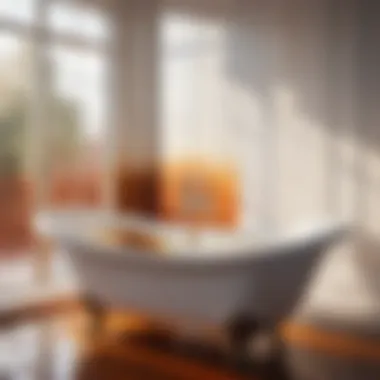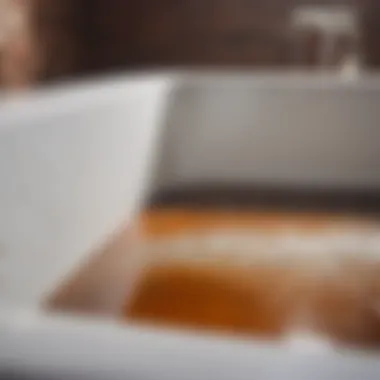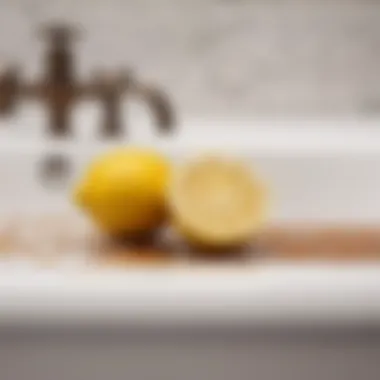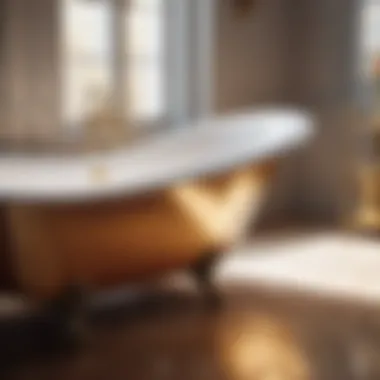Effective Methods for Rust Removal from Bathtub: A Comprehensive Guide


Materials:
- White vinegar: 2 cups
- Baking soda: 1 cup
- Lemon: 1
- Salt: ½ cup
- Soft-bristle brush
- Microfiber cloth
DIY Steps:
- Preparation: Gather all materials and ensure the bathtub is dry.
- Vinegar Solution: Mix 1 cup of vinegar with 3 tablespoons of baking soda to form a paste.
- Application: Apply the paste to rust stains and let it sit for 10-15 minutes.
- Scrubbing: Use a soft-bristle brush to scrub the rust gently in circular motions.
- Rinse: Wipe the area with a wet microfiber cloth to remove the paste residue.
- Lemon-Salt Scrub: Cut a lemon in half, dip it in salt, and scrub remaining rust marks.
- Final Rinse: Rinse the bathtub thoroughly with water to remove all residue.
Technical Aspects:
- Timing is crucial; ensure each step is given ample time to work effectively.
- Use gentle pressure when scrubbing to avoid damaging the bathtub surface.
- Test the cleaning solution on a small, inconspicuous area first to check for any adverse reactions.
DIY Project Process:
- Follow the steps in sequence to ensure the best results.
- In case of stubborn rust, repeat the process or consider professional assistance.
Troubleshooting Tips:
- If the rust persists, increase the vinegar concentration or let the paste sit longer.
- For enamel bathtubs, be gentler in scrubbing to prevent scratches and damage.
Understanding Rust in Bathtubs
Rust in bathtubs is a common issue that many housewives and house owners encounter. It not only impacts the visual appeal of the bathtub but also poses potential health hazards due to bacteria growth. Understanding the root causes of rust formation is crucial in effectively addressing this problem. By exploring the factors contributing to rust, such as hard water deposits, scratches or chips in the enamel, and prolonged exposure to moisture, one can grasp the mechanisms leading to rust development. This knowledge empowers individuals to proactively tackle rust issues in their bathtubs, ensuring a clean and hygienic bathing environment.
Causes of Rust Formation


Hard water deposits
Hard water deposits are a significant factor in rust formation in bathtubs. The minerals present in hard water can react with the surface of the bathtub, leading to corrosion and rust over time. Despite being a common occurrence in many households, hard water deposits necessitate prompt attention to prevent extensive rusting. By understanding the implications of hard water deposits, individuals can implement suitable cleaning and maintenance practices to mitigate their effects on the bathtub's surface.
Scratches or chips in the enamel
Scratches or chips in the enamel of a bathtub create vulnerable spots where rust can easily take hold. These imperfections compromise the protective layer of the bathtub, making it more susceptible to corrosion. Regular inspection and prompt repair of any scratches or chips are essential to prevent rust formation and maintain the integrity of the bathtub's surface.
Exposure to moisture over time
Prolonged exposure to moisture is another key factor contributing to rust formation in bathtubs. Moist conditions provide an ideal environment for rust to develop, especially in areas prone to water splashes or leaks. Addressing sources of moisture and ensuring adequate ventilation in the bathroom are crucial preventive measures against rust formation. By controlling moisture levels, individuals can significantly reduce the likelihood of rust affecting their bathtub surfaces.
Impact of Rust on Bathtub Surface
Aesthetic deterioration
Rust not only mars the appearance of a bathtub but also detracts from the overall aesthetics of the bathroom. Unsightly rust stains can be challenging to remove and may significantly diminish the visual appeal of the bathtub. To maintain a clean and pristine bathroom environment, addressing rust-induced aesthetic deterioration is paramount.
Health concerns due to bacteria growth
The presence of rust in a bathtub can harbor harmful bacteria, putting individuals at risk of infections or skin irritations. Bacteria thrive in rusty environments, making regular rust removal essential for safeguarding health. By eradicating rust and maintaining a hygienic bathtub, homeowners can create a safe bathing space free from potential health hazards.
Decreased longevity of the bathtub
Rust accelerates the deterioration of the bathtub surface, leading to a decrease in its lifespan. The structural integrity of the bathtub is compromised as rust takes hold, causing irreversible damage over time. To prolong the longevity of the bathtub and avoid costly replacements, preventing and addressing rust formation are crucial steps to undertake.
Methods for Removing Rust


Removing rust from a bathtub is a crucial task to maintain its aesthetics and hygiene. In this section, we will delve into various methods and techniques for effectively eliminating rust stains and preventing their recurrence. By understanding the specific elements associated with rust removal, homeowners can ensure a pristine bathing environment for themselves and their families.
Chemical Cleaners
Chemical cleaners serve as potent agents in combating stubborn rust stains. Their efficacy lies in their ability to dissolve and eliminate rust from the surface of the bathtub. Usage instructions for rust removal products play a pivotal role in achieving optimal results. Following the correct application methods and recommended dosage ensures thorough rust removal without damaging the bathtub enamel. While these products offer a quick and convenient solution, users must consider the precautions necessary while handling chemicals. Proper ventilation, protective gear, and adherence to safety guidelines are crucial to prevent any negative health impacts.
Natural Remedies
Apart from chemical cleaners, natural remedies such as vinegar and baking soda provide a safe and environmentally friendly alternative for rust removal. The application of a vinegar and baking soda paste on rusted areas can effectively break down the stains, allowing for easy scrubbing and removal. This natural concoction's mild abrasive properties make it suitable for delicate bathtub surfaces, ensuring rust removal without causing damage. On the other hand, lemon and salt paste offer a refreshing and citrusy solution for combating rust stains. The acidic nature of lemon juice combined with abrasive salt particles creates a powerful mixture that effectively lifts rust from the bathtub surface.
Mechanical Methods
For tough rust spots that resist chemical cleaners and natural remedies, mechanical methods provide an excellent alternative. Scrubbing with abrasive materials such as steel wool or nylon scrub brushes can help dislodge stubborn rust deposits from the bathtub surface. These materials work by physically breaking down the rust, restoring the bathtub's shine and cleanliness. Additionally, using a pumice stone on stubborn rust spots offers a gentle yet effective abrasive method for targeted rust removal. The pumice stone's porous texture allows it to grab onto rust particles, making it ideal for precision rust elimination without scratching the bathtub surface.
Preventive Measures
To maintain a spotless and rust-free bathtub, implementing preventive measures is paramount. By incorporating a regular cleaning routine and ensuring timely sealing and repairs, you can safeguard your bathtub's longevity and aesthetic appeal.
Regular Cleaning Routine
Tips for Maintaining a Clean Bathtub Surface
Taking care of your bathtub surface is essential to prevent rust formation and maintain a hygienic bathing environment. Regularly cleaning with mild soap and water can help remove dirt and grime that can contribute to rust. Additionally, using gentle scrubbers or sponges and avoiding harsh chemical cleaners can protect the enamel and prevent scratches that may lead to rust.
Moreover, incorporating natural cleaning solutions like vinegar and baking soda can effectively eliminate mineral deposits and inhibit rust development. These eco-friendly alternatives not only sanitize the bathtub but also leave a refreshing scent without harsh chemical residues. Consistent upkeep of cleanliness in your bathtub is key to preventing rust buildup and ensuring a pristine bathing space.


Preventive Actions to Avoid Rust Formation
Preventive measures play a crucial role in halting rust in its tracks. One effective strategy is to promptly address any chips or cracks in the bathtub surface by sealing them with waterproof sealant. By maintaining a watertight barrier, you can prevent moisture from seeping into vulnerable areas and initiating rust formation.
Furthermore, incorporating a routine inspection schedule can help identify early signs of rust or deterioration, allowing for swift intervention before the problem escalates. Applying a coat of enamel repair paint over exposed areas can act as a protective shield against rust, prolonging the bathtub's lifespan and preserving its appearance. These proactive measures not only enhance the structural integrity of your bathtub but also contribute to a cleaner and safer bathing experience.
Sealing and Repairs
Importance of Sealing Cracks and Chips
Sealing cracks and chips in your bathtub is a critical step in preventing rust and maintaining its overall condition. These vulnerable areas provide an entry point for moisture, leading to rust formation and compromise the structural integrity of the tub.
By applying a silicone-based sealant specifically designed for bathtubs, you can create a moisture-resistant barrier that protects against water infiltration and subsequent rust. Regularly inspecting and resealing any damaged areas ensures ongoing protection and preserves the appearance of your bathtub for years to come.
Professional Repairs for Severe Rust Damage
In cases where rust damage is extensive or severe, seeking professional repairs is advisable to restore the bathtub's functionality and aesthetics. Professional repair services can provide in-depth assessments of the damage, recommend suitable solutions, and execute specialized repairs to rectify severe rust issues.
Experienced technicians can utilize advanced techniques such as chemical treatments or refinishing processes to eliminate rust, treat affected areas, and restore the bathtub's original finish. Engaging professional services not only ensures thorough rust removal but also guarantees a durable and long-lasting repair that enhances the overall quality of your bathtub.
Seeking Professional Help
When dealing with persistent rust issues in your bathtub, seeking professional help can be a wise decision to ensure thorough and effective removal. Professional cleaners offer specialized expertise and tools that might not be readily available to the average homeowner. By enlisting professional services, you can benefit from their experience in dealing with various types of rust and surface materials, ensuring a tailored approach to your specific bathtub situation. Additionally, professionals can recommend preventive measures to avoid future rust formation, adding value to the restoration process. Understanding the limitations of DIY methods, professional assistance guarantees a higher level of accuracy and precision in rust removal, leaving your bathtub looking brand new.
Consulting a Professional Cleaner
Benefits of Professional Rust Removal Services
Opting for professional rust removal services presents a multitude of benefits for homeowners facing stubborn bathtub rust. One key aspect is the use of industrial-grade cleaners and equipment, which can tackle deep-seated rust without damaging the bathtub surface. Professional cleaners are well-versed in the most effective techniques for rust removal, ensuring a comprehensive and long-lasting solution to the problem. Moreover, their expertise allows for swift and efficient rust removal, saving homeowners time and effort. By investing in professional services, individuals can enjoy a restored bathtub free from rust stains, enhancing the overall appeal of their bathroom space.
Cost Considerations and Timelines
When considering professional rust removal services, it is essential to weigh the cost against the benefits provided. While professional cleaning may entail an initial investment, the long-term results often justify the expense. Additionally, the time saved by professionals in removing rust and restoring the bathtub can be invaluable to homeowners with busy schedules. Taking into account the efficiency and effectiveness of professional cleaners, the cost becomes a worthwhile consideration for those seeking a hassle-free solution to rust problems. Moreover, professionals adhere to specific timelines, ensuring prompt rust removal and minimal disruption to your daily routine.







